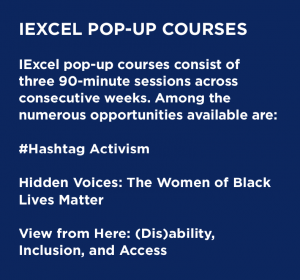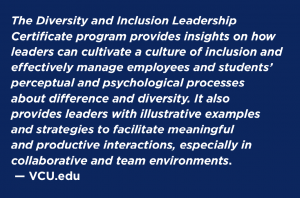Diversity Champions exemplify an unyielding commitment to diversity and inclusion throughout their campus communities, across academic programs, and at the highest administrative levels. INSIGHT Into Diversity selected institutions that rank in the top tier of Higher Education Excellence in Diversity (HEED) Award recipients.
Virginia Commonwealth University (VCU), a renowned research institution that is home to nearly 30,000 students, has become a national leader in campus diversity, equity, and inclusion (DEI) through hard work and innovation.

The VCU community understands that their DEI mission must go beyond “diversity for the sake of diversity,” says Aashir Nasim, PhD, vice president of Institutional Equity, Effectiveness, and Success.

“We believe in diversity driving excellence,” Nasim explains. “We’re committed to equity-based principles in policy development and implementation, and we’re intentional in how we leverage diversity and inclusion in our everyday practices, programs, and procedures. We collaborate in the generation of inclusive frameworks employed by our academic professionals engaged in high-impact pedagogies, scholarship and practices. We’re committed because we want to ultimately advance the university’s mission and goals.”
Many of VCU’s DEI efforts are the result of cross-campus teamwork among dedicated faculty and researchers, staff, and students. Its Office of Institutional Equity, Effectiveness, and Success and the Division for Inclusive Excellence have prioritized educational opportunities that develop DEI principles and social awareness for the entire VCU community. They are also proactive in engaging with faculty, staff, and students and ensuring that every person has their voice heard.
IExcel Education
IExcel Education provides a range of free DEI courses, workshops, seminars, and training for faculty, staff, students, and community partners. The program was designed to help VCU community members advance far beyond typical compliance training or simply learning best practices.
for faculty, staff, students, and community partners. The program was designed to help VCU community members advance far beyond typical compliance training or simply learning best practices.
“IExcel Education helps faculty, employees, and students understand the nuances of diversity and provides actual skills and competencies that help create not just a diverse environment, but a truly inclusive one,” says Nasim. “We have courses related to topics such as neurodiversity, gender beyond the binary, or implicit bias in health care. We offer seminars and workshops about how to engage in inclusive faculty recruitment practices, how to give constructive feedback, and much more.”
The program offers more than 30 educational opportunities in a variety of formats and timeframes. Students can attend specialized pop-up courses that consist of three 90-minute sessions across consecutive weeks. Each course takes a unique approach when it comes to engaging students in dynamic learning experiences.— whether that means learning about disability access at a local restaurant or creating digital stories at sites tied to the history of slavery. The courses are based on highly relevant topics, including the role of protest music in bringing about social change, visibility in the LGBTQ community, women’s participation in the Black Lives Matter movement, and more.
IExcel Education’s signature offering is the Diversity and Inclusion Leadership Certificate program, which is targeted toward senior administrators on campus, according to Nasim. Participants must complete five courses, each consisting of eight contact hours across a four-week period, to earn certification. The program includes four core classes focused on leadership and DEI and one specialty elective. These electives provide pertinent training for leaders across multiple offices and units, ranging from health care to pedagogy to corporate culture and beyond.
Specific courses for the certificate program include Fundamentals of Diversity and Inclusion, Advancing Diversity and Equity in Corporate Settings, and Bias and Microaggressions. The certificate program also offers seminars, training, and workshops that cover a variety of DEI-related issues. Participants can select from such unique options as Combating Health Inequities, Creating an Age Inclusive Academic Workplace, and Inclusive Recruitment Practices.

Each of these educational offerings shares the common goal of advancing VCU’s mission of “diversity driving excellence,” says Nasim. The Inclusive Recruitment Practices seminar, for example, teaches participants about the university’s unique approach to the recruitment and retention of diverse faculty. This approach includes looking at onboarding as a two- to three-year process. “We create these very highly specialized onboarding packages for faculty that last at least one year and include professional development opportunities,” Nasim explains.
“diversity driving excellence,” says Nasim. The Inclusive Recruitment Practices seminar, for example, teaches participants about the university’s unique approach to the recruitment and retention of diverse faculty. This approach includes looking at onboarding as a two- to three-year process. “We create these very highly specialized onboarding packages for faculty that last at least one year and include professional development opportunities,” Nasim explains.
“The Diversity and Inclusion Leadership Certificate is important because we need our leaders to be able to set the tone for the climate and culture in which they oversee and supervise,” Nasim explains. Employees who complete this extensive professional development program receive a virtual certification that they can add to their CVs, LinkedIn profiles, and email signatures to show that they have advanced competencies and knowledge in DEI.
Developing the IExcel Education program was a year-long endeavor that utilized the expertise of multiple parties across the VCU and Richmond community. “We decided to build this program in-house because we knew that we have considerable expertise across faculty, academic support staff, other employees, and our community partners here in Richmond,” Nasim says. His office worked closely with faculty and staff from the VCU Business School, VCU Health System, and more. These experts operated as in-house consultants and received stipends for helping to develop more than 30 different offerings.
Climatext and Ramalogues
Among VCU’s DEI innovations is the Climatext program, which allows university officials to check in with students and employees regarding campus climate on an ongoing basis. VCU’s Office of Equity, Effectiveness, and Success texts those who enroll in the program with specific questions about how they feel regarding current issues such as feeling safe on campus during the pandemic.

Individuals sign up voluntarily for the program, and all answers are anonymous. Recipients can respond using text or emojis, which the university then processes using the “sentiment analysis software” that it created for the Climatext program, Nasim says.
The university is able to maintain user privacy while still sorting responses by demographics and characteristics, such as first-generation status, age, race and ethnicity, and more, according to VCU webmaster Sam Yerkes. “The reply is anonymized, so we can’t tell exactly who the person is but we can match demographic information to say, for example, that a senior student studying in this specific program and who lives in this specific residence hall feels very poorly today about whatever topic,” he explains. As soon as the replies start coming in, VCU is able to begin aggregating the data and make correlations about responses. The information is then stored in a database that Nasim and others can use to better understand campus climate, inform their decision-making, and more.
The technology has been important for staying attuned to students during the pandemic and for receiving regular feedback from campus community members.

“We collect this real time data and share it with senior leaders who make policy decisions or make decisions about reopening the university, for instance. So this is a quick way for us to collect data, get a sense of what students are feeling, and then be able to incorporate that information into our policy reforms or decisions about things like reopening campus or expanding remote instruction,” explains Nasim.
Another, more personal method of engaging with students and employees regarding DEI issues is RAMalogues, an IExcel program that brings campus community members together to discuss difficult topics related to social identities and lived experiences. The discussions typically consist of 12 to 25 participants plus a faculty or staff facilitator. Student and employee sessions are held separately, and they allow participants to share how they have been personally affected by pressing issues. Recent sessions have included the following:
Living and Learning Amid Racism and a Pandemic
Me and My People: Ethnicity and Stigma at VCU During a Pandemic
How Coronavirus Affects Me
Money, Family, Background: What Opens Doors at VCU?
Intersectionality: Both…and…100% All of Me
Over the course of the pandemic, many of these discussions were held online and were a crucial way for students to maintain connections with the campus community from afar. The sessions serve as an outlet to share one’s own thoughts and feelings while developing a collective understanding of others’ experiences, Nasim says.
“The feedback has been tremendously positive, and students feel a greater sense of community,” he states.
The Institute for Inclusion, Inquiry and Innovation
Another innovative way that VCU facilitates connections to improve community is through the Institute for Inclusion, Inquiry and Innovation (iCubed). The institute links university experts and students with the local community to apply their knowledge and passion to solving real-world issues and improving quality of life for the residents of Richmond. It focuses on several core areas, including:
Oral Health Equity
Intersections in the Lives of LGBTQIA+ Communities
Sustainable Food Access
Urban Education and Family
Disrupting Criminalization in Education
Health and Wellness in Aging Populations
Racial Equity, Arts, and Culture
Culture, Race, and Health
Faika Zanjani, PhD, is the associate director of academic programs and research training

for iCubed as well as an associate professor of gerontology in the VCU College of Health Professions. She focuses on research development and community programming for iCubed’s Health and Wellness in Aging Populations core and, in her associate director role, mentors students in iCubed’s Commonwealth Scholars Program (CSP). The research mentorship program matches undergraduate and graduate students who demonstrate financial need and have a passion for equity and inclusion with iCubed faculty and researchers in their areas of interest.
“We are really interested in supporting students of high caliber and high need, and that makes our program unique,” Zanjani says. Rather than requiring students to submit reference letters or applications that contain past research experience, CSP selects students based on GPA and their passion for equity and inclusion. These requirements are strategic, as low-income students often do not have the professional networks to provide references or have access to research opportunities, Zanjani explains.

By matching CSP students with iCubed faculty in their area of interest, the program provides them with a combination of mentorship, research experience, and the type of productivity that looks impressive on future applications. Students conduct community research and service alongside their faculty mentors during the one-year program and deliver at least one presentation on their research at VCU conferences or symposia.
The students who come into the program may not have a specific project or research focus in mind, but iCubed helps them connect with potential interests through data collection, analysis, development of projects, and community outreach. Zanjani helped mentor a CSP student who had a vague idea that she wanted to promote senior health and ultimately decided that health interventions and messaging were far from inclusive. The student noticed that much of this messaging is directed at young people, and what messaging is actually aimed at senior citizens tends to only target those who are White. Zanjani’s mentee surveyed local Black senior citizens about the activities they liked to participate in as well as some of their health concerns. The student then used that real-world data to create an informative poster of healthy activities such as gardening for local diverse communities.

“A lot of the students who come into the program have never been exposed to research work before, and they say they feel like their world has changed because now they understand the process behind facts and knowledge,” Zanjani explains.
Other universities could learn to emulate programs such as iCubed and CSP that connect researchers, students, and the community to create a more equitable society, she says. “I think [other institutions] may be looking at our model because we’re not just embedding diversity, inclusion, and equality within our programs to check a box,” she says. “Our projects are embedded in diversity and inclusion to actually address health disparities and [other issues], and others may see this is really a different approach.”●
Mariah Bohanon is the senior editor of INSIGHT Into Diversity. Virginia Commonwealth University is a 2018-2020 recipient of the INSIGHT Into Diversity Higher Education Excellence in Diversity (HEED) Award and a 2019 and 2020 Diversity Champion.
This article was published in our June 2021 issue.




















